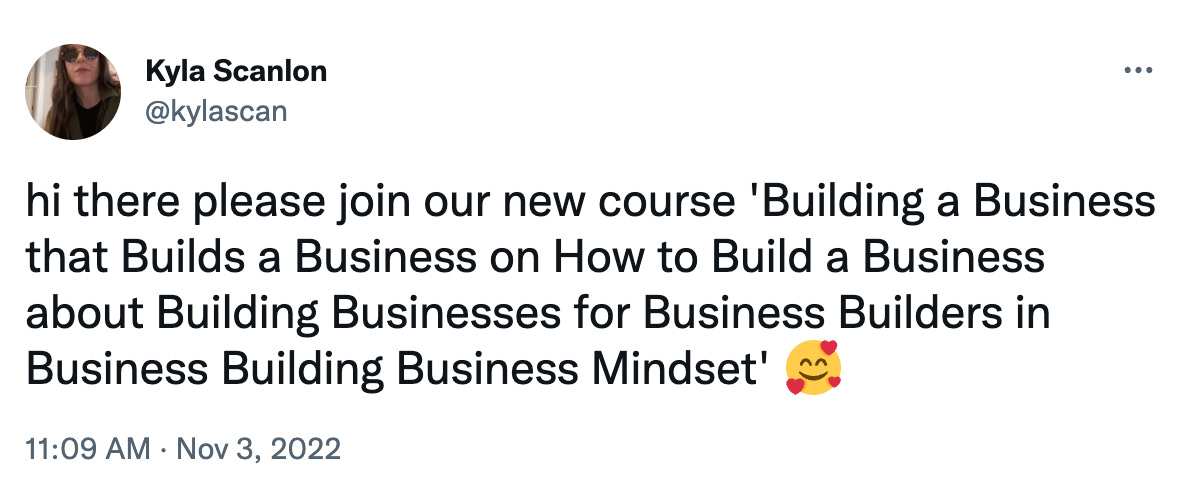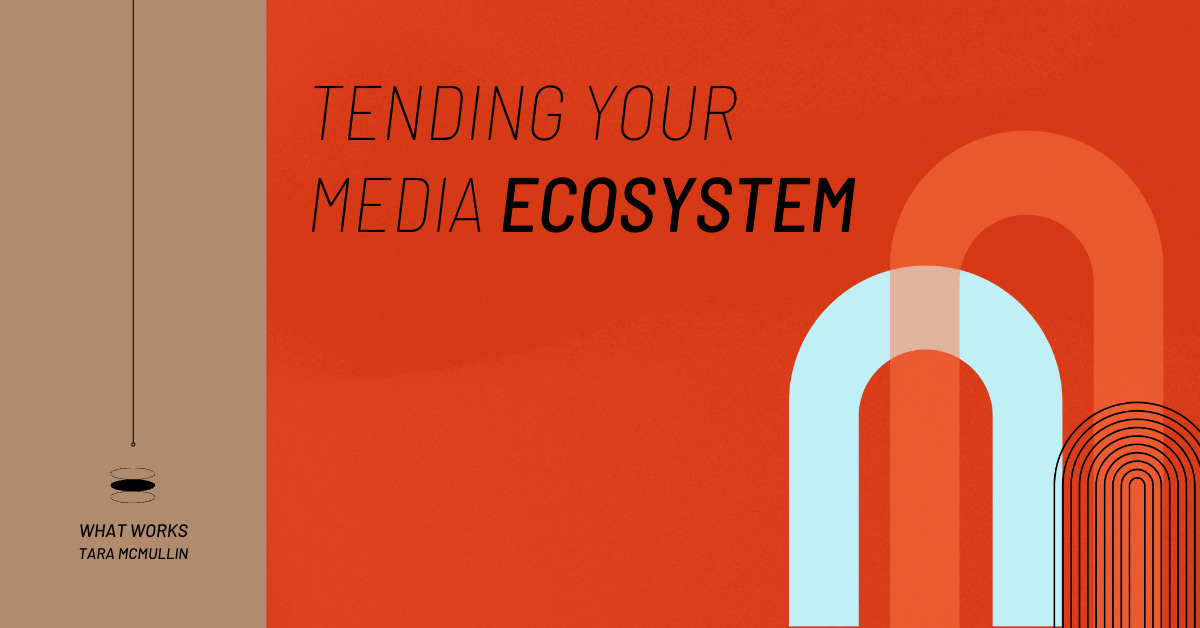Breaking the Meta Cycle: Resisting Abstraction to Create More Satisfying Work
Many companies—large and very small—boost profits by "going meta." But going meta inevitably changes the relationship between work and value. What if we put work first?

There's a sort of inside joke in the online business space of coaches, creators, and service providers.
Or maybe, at this point, it's an "outside joke?" Is that a thing?
Q: What's the surest way to make more money as a creator or small business owner?
A: Teach other people how to make money as a creator or small business owner.
Or here's how
, who specializes in explaining economics through a human-focused lens, skewered this trope in a tweet at the end of 2022:"hi there please join our new course 'Building a Business that Builds a Business on How to Build a Business about Building Businesses for Business Builders in Business Building Business Mindset'"
— Kyla Scanlon on Twitter, @kylascan
In other words, the surest way to make money online is to go meta.
It's easy to poke fun at the seemingly inevitable evolution of ambitious (or desperate) people from creating value to teaching others to create value.
And it can seem like an anomaly in the market at large—after all, it's not like Ford executives go around teaching other people how to build car companies. But it is actually indicative of a macro-trend in business.
The best way to fuel perpetual growth today is by "going meta," argues media theorist Douglas Rushkoff in his book Survival of the Richest. He writes:
"Entrepreneurship today has less to do with innovating a product than innovating on the business model for growth. Never is the growth itself questioned."
Here's how it works.
Take those Ford executives. Like I said, they're not teaching others how to build car companies. But Ford has gone meta in its own way. Strange but true: Ford is not really in the car business anymore. While car sales do still generate the vast majority of Ford's overall revenue, Ford Credit is responsible for as much as 100% of its profit.
Sure, Ford builds and sells cars—but, at this point, building and selling cars are only a means for extending loans to buyers so that they can profit off the interest. "At some point," writes Rushkoff, "manufacturing hits the hard limits of human labor and physical matter itself."
Zuckerberg is doing something similarly meta at Meta right now. I mean, if that isn't obvious, I don't know what is! What started, ostensibly, as a technology product designed to connect people, went meta by aggregating those people's data to sell to advertisers in the form of interests and audiences. In the process, they stopped making decisions based on the objective of connecting people and started making decisions designed to extract more data from users and maximize ad inventory.
As the public began to sour on that business model and corporations like Apple began to make gathering data much more difficult, the company decided to go meta again. This time, they actually became Meta and ventured into the techno-utopian metaverse to extract potential profit there.
Decisions that redirect the core business of a company destabilize operations.
Sometimes that's necessary. But it always comes at a human cost. When a company decides that has a new strategic priority, it rearranges operations to focus more resources on that priority. Historically, capital concerns itself with the ins and outs of what will generate more capital, rather than the people who contribute to its production. Organizational structure often changes, and with it, people often lose their jobs—or, at the least, they lose the connection they had to the value they created for the company.
Going meta means leaning into abstraction.
Consider the stock market. Buying shares in a company is abstract—but it's concrete enough for us all to understand it. But what about stock options, or derivatives, or asset-backed securities? Each has an abstract relationship to another form of abstract ownership. An investor no longer owns a small piece of a company, they own the idea of that piece in relation to another idea.
I know that sounds bonkers. Because it is.
Abstraction after abstraction widens the distance between the value being created and the people creating that value. Abstraction leads to greater alienation. We sit down at our desks or go into the office—but we don't ever see the product we create because, more often than not, that "product" is really profit someone else will enjoy.
Work feels less like "useful labor" and more like "useless" toil.
British polymath William Morris published an essay titled "Useful Labor versus Useless Toil" in 1893. In it, he aims to define what makes for satisfying work and arrives at 3 conditions. Satisfying work "carries with it the hope of pleasure in rest, the hope of pleasure in our using what it makes, and the hope of pleasure in our daily creative skill." Writing in the midst of the second industrial revolution, Morris was well-positioned to observe how changes in the way goods were produced changed the way workers related to work.
Each time a company goes meta, workers are less likely to take any pleasure in using what the company makes (e.g., if Ford is really "making" interest via auto loans, this doesn't relate to the engineer in the electric vehicles department in any way). Further, they're less likely to recognize their own creative skill in the process of work because what they're creating is most often immaterial.
I am sure that many companies which have gone meta still have employees who enjoy their jobs or get a thrill out of contributing to a great product. But roles in which this is possible are becoming fewer and fewer. Even among small business owners and creators who make their own decisions about going meta, I observe a sad resignation that this is the work they do now—rather than the work they once found pleasure in.
Further, going meta and profiting from abstraction results in hollowing out the middle of the workforce, an economic trend that few people in power want to acknowledge. There is plenty of work for people with “meta skills” like data analysis and legal services. And growing sector of service work—or should we say, servant work?—to make those meta workers' lives more convenient. But the middle gets thinner and thinner with each turn of the economic cycle.
How can it be that so much work today falls into what Morris would deem "useless toil" when we live in the era of "do what you love?" We spend a lot of time and money in education, career development, and recruiting to convince people that they love work that doesn't provide the productive outlet that humans crave.
If going meta creates the problem, what then might be a solution?
What if we re-imagined the way we create work for ourselves and for others? What if we asked ourselves what a role could look like that does provide hope for rest, hope for use, and hope for exercising creative skill? What if a job wasn't the smallest unit of human labor required to extract value from the system, but a container for creating value together in new ways?
What if we considered the kind of work we want to create before we decided on the profit strategy?
"Human inventions often end up at cross purposes with their original intentions," writes Rushkoff in his manifesto, Team Human. We make things to serve us, they take on a life of their own, and then we work to serve the very things we've created. "[W]e forget who is doing what for whom, and why," explains Rushkoff, "We risk treating other people as objects. Worse, we embed these values in our organizations or encode them into our technologies."
We created this strategy of "going meta" to counteract the effects of competition and declining profit margins.
At first, it seemed like a genius move. But today, "going meta" over and over again is baked into the business plan almost from the beginning. And quite often, that means extractive relationships and self-objectification are baked in, too. The values behind the genius of our invention turn into the kind of values that drive the impulse to go meta.
I can't tell you how many small business owners I've talked to who seem to have internalized this "meta growth." First, they'll offer a service. Then they'll turn it into a group program. And finally, they'll teach other people how to do what they do. I ask if that's what they want to do. I'm not sure anyone has ever said, "yes." Instead, they'll explain that while they love actually doing the work, they know they can't "scale" it or that to really build something that "works," they need to follow that tried and true plan.
They're not wrong. But it's also not the only option.
I'm not here to look down on anyone for moving into the "teach people how to make money online" sector of the digital economy. Or from writing to teaching people how to write. Or from coaching to teaching people how to coach. Or from marketing to teaching others how to market. Or any other permutation you can dream up.
I mean, business education has been a big part of my own financial and content footprint for more than a decade. But I do think it's worth considering how the destabilizing and dehumanizing externalities inherent to Fortune 100 companies are often present in the way we seek to increase our own revenue as business owners and independent workers.
It's easy to trick ourselves into viewing any superficial change we catalyze as value. Or to convince ourselves that "going meta" is the only way to stay ahead of the market.
But at what point do the ways we earn money stop being about producing real value?
It is actually possible to resist going meta and build a business or an independent career by producing real value. Truthfully, it might not have the 100x growth rate that purveyors of meta-strategy promise. But it does have the benefit of connecting us to those who benefit from the value we produce and the people who help us produce it. And that's enough to reclaim the hope of pleasure in our daily creative skill.
Subscriber Workshop: Tending Your Media Ecosystem
People often ask me how I write and publish so much. Though I’m humbled by the prolificness of some folks on Substack!
The first answer is that it's my job—it's literally what I spend most of my time doing.
The second, more relevant, answer is that I've intentionally created a media ecosystem that gives me what I need to do this work.
What's a media ecosystem? It's a system of inputs and outputs that help me read, listen, and watch what I need to help me write, publish, and share.
In this 60-minute workshop, I'll share:
How I curate my media inputs
Why I've landed on the current set of media outputs
How an essay & podcast episode come together from bits of inspiration and connected ideas
Plus, I'm happy to answer questions about how I think about social media, audience, developing series, research, and more!
Price: Free for paid subscribers
Date: May 31 @ 1:30pm ET/10:30am PT
Venue: Crowdcast
The session will be recorded and added to the archive for paid subscribers!






OH MY MY MY....this is the crux of our broken selves, of why we don't look to each other on the sidewalk and smile...what's there to smile about when you don't even know why you feel so empty. You just are. So sad, so wrong. What have we done? We've pivoted off a while back, off the center of our reason for being here in the first place! Tara, I'm so happy to find you! Thank you so much for spelling out, simply, a huge deficit, a huge gap between joy and hell, stupor. Stupor from toiling for nothing, an invisible jail. Where is our VALUE! I was a massage therapist in NYC and I felt I really added value to a lot of tense wonderful New Yorkers. I am an actor and this was how I paid my rent. On many occasions it was more satisfying than reading another script where the woman's part was once again weak or uninteresting. I learned to write my own! I believe we can create OUR OWN WORK with great value again. We may have to build our own communities from scratch again. Rewrite the story of Earth People. My whole body stiffens in objection to working META. I just can't. I can feel my heart shut down and then my joy stops. Let's start a HEART MOVEMENT! ❣️